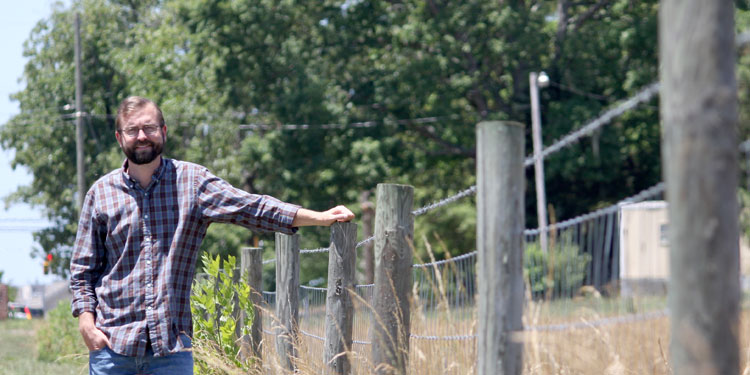
ZACK WYATT AT ALEXANDER FARM ON WESTMORELAND
April 9. By Dave Yochum. As supermarket chains report their first coronavirus-related employee deaths—leading to growing anxiety among grocery workers—and farmers report critical shortages of workers, supply chain experts are looking at the nation’s food and how it gets from farm to market.
“The system was fragile in the normal state. The entire physical system we live under is at its breaking point,” says Zack Wyatt, a Cornelius technology sales executive who is the founder of Carolina Farm Trust. The non-profit seeks to preserve farmland in North Carolina as well as the culture of local farming and access to local markets.
Food ‘deserts’
Fifteen percent of the county’s population lives in low-income communities where most residents don’t have access to a full-service grocery store or supermarket carrying nutritious food. The national average is 11 percent, according to the U.S. Department of Agriculture.
Wyatt said the moment truckers and other key staff in our supply chain start to test positive then the supply chain will start to break.
The nation’s food chain is a supply network with groups of manufacturing facilities connected by transportation routes and storage nodes along the way.
What we’re seeing are small breaks here and there:
+Hit or miss supplies of packaged meat, poultry and eggs—not just toilet paper—at grocery stores as panic-buyers stock up.
+NC prison workers, who have provided labor at poultry processing facilities around North Carolina, have filed an emergency lawsuit asking for early release due to the COVID-19 pandemic which is reaching inside prison walls.
+Bloomberg news reports several people who worked at plants owned by Tyson Foods and a local unit of Brazil’s JBS SA have died from the pandemic. Smithfield Foods has 80 COVID cases at a facility in South Dakota.
+The United Nations says although the world’s food supply chain is intact at the moment, anxiety-driven panic buying by major food importers could quickly change that.
What’s happening is that the world’s food supply is driven by people—regardless of whether they’ve snacked on a Chinese bat or the latest e-coli tainted lettuce scare from California.
Hands-on processes
Farmers rely on labor-intensive harvesting, while mass producers/manufacturers rely on processes that require people to work closely together—in spite of social distancing requirements.
Strawberry crops, for example, may be at risk.
At the same time, harvests and product may arrive by truck. If truck drivers become sick, or if they’re banned from rest areas, disruptions could ensue.
It’s difficult to predict exactly where disruptions can happen.
Distribution at risk
The Federal Motor Carrier Safety Administration has extended a national emergency declaration that allows truckers to dispense with hours-of-service rules for liquefied gases to be used in refrigeration systems. Picture enormous refrigerated food warehouses.
Wyatt, who said North Carolina is in a good position to make positive change around local food and getting it to market, said the current supply chain is not working for people without the transportation and budget to buy and stock up on items they need.
“That is not the reality for the population on the lower rungs of the socioeconomic ladder,” Wyatt said. “Our entire reaction to this crisis has been reactive. We are trying to put a proactive strategy together to make sure our local food system and food economy can get through this for everyone.”
“We are lucky to live in an area where we can if we can get production up to meet our regional needs,” Wyatt said.
The Carolina Farm Trust is building out a 6.5 acre urban farm in East Charlotte that is 6.5 acres to help bring fresh and healthy produce to low-income populations. CFT has also signed a long-term lease on 28 acres in Huntersville that will help local farmers access land, not giant corporations.
Wyatt is in the midst of a $250,000 fundraising campaign, a start on the $3 million needed to fund a comprehensive local farm movement.
“If the federal government is putting trillions into our financial system, we need to wake up into what we need to be doing at the local level,” he said.
CFT functions as a facilitator: It gets farmers onto the land and then steps back.
There is still land in Huntersville and Cornelius. It was just a few years ago that the Alexander Farm at Westmoreland and West Catawba was actively farmed. Last on the market for $12 million, it will be turned into a $110 million mixed-use project.
Wyatt wants CFT to make Charlotte a global leader in sustainable food production, with a network of urban farms and farmland surrounding the city.
“If we wake up and get more land into farming we could support a good percentage of our town’s food supply within the county and even more so from our region. COVID-19 started from food safety issues and we continue to outsource our food supply to China and continue to deregulate food safety regulations here in the US,” Wyatt said.
PHOTO BY DAVE YOCHUM




